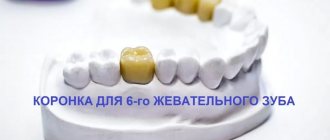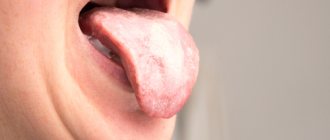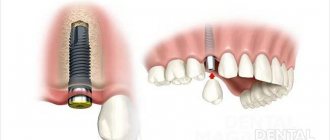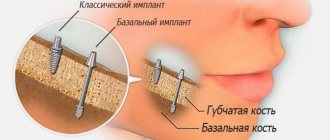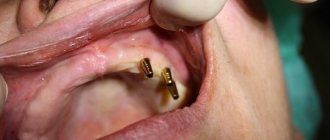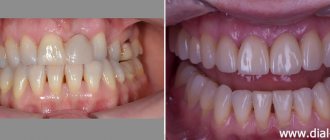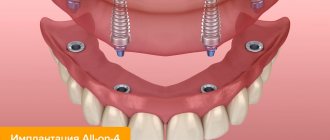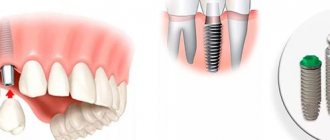The technology of installing artificial roots and then attaching dental crowns to them is becoming more and more popular every year. This is explained by several reasons. Firstly, every year there are more and more clinics in which dentists have mastered this technology. The second reason is the successful development of the technology itself, which has led to fewer and fewer cases of implant failure. Finally, the materials themselves are becoming higher quality, and therefore more durable.
PIC-Optima as a replacement for titanium implants
PIK-Optima is a new biological polymer material from which it is possible to produce implants that are not inferior in their characteristics to titanium analogues. This material was created by French scientists. In 2005, a pilot batch of artificial dental roots was produced from it for the first time. Implants made from PIC-Optima biopolymer have the following advantages:
- very long service life;
- maximum similarity of the material to the bone structure of the jaw;
- the material does not cause an allergic reaction in patients;
- high resistance to chemical influences.
It is also noteworthy that PIK-Optima can be used both to strengthen soft tissues and to strengthen and even replace bone tissue in the oral cavity. Moreover, unlike titanium alloys, this material is very plastic. This allows implants to be manufactured to a given size as accurately as possible, and the flexibility of the material does not provoke bone tissue destruction.
Contraindications
One-stage implantation is not possible if:
- diseases of bone tissue (osteoporosis);
- inflammatory diseases of periodontal and periodontal tissues;
- large width of the socket of the extracted tooth (the implant cannot be firmly fixed);
- formations in tissues - cysts, granulomas;
- atrophic changes in bone tissue, alveolar processes.
Both one- and two-stage implantation are not performed in case of general surgical contraindications and a number of diseases and conditions:
- diseases of the blood, blood-forming organs, coagulation disorders;
- mental illness;
- oncological diseases;
- allergic reactions - to anesthetics, drugs and materials used;
- endocrine pathologies;
- severe diseases of the cardiovascular system;
- HIV;
- connective tissue diseases.
Relative contraindications to two-stage implantation are:
- changes in the tone of the chewing muscles (requires preliminary treatment, correction), the need for sanitation of the oral cavity (caries, gum inflammation, periodontal disease),
- smoking,
- some bite defects,
- exacerbation of chronic diseases,
- the use of certain medications that change the composition of the blood or are incompatible with anesthesia drugs,
- insufficiently good oral hygiene.
Zirconium dioxide implants
Implants made from zirconium dioxide successfully replace metal structures. In addition, zirconium implants are implanted into bone tissue much faster than titanium ones. Zirconium dioxide is highly resistant to mechanical loads, both static and dynamic. It is quite easy to process and integrate into the jaw bones.
The advantages of the material include:
- high strength;
- long service life;
- no allergic reaction in patients.
Zirconium dioxide, unlike titanium alloys, does not release metal microparticles into the soft tissues of the oral cavity.
SGS Premium
SGS Premium
Implants from SGS Dental System Holding have a very interesting geography. The company is Swiss, but the implants themselves are manufactured in Hungary, and the surface treatment is carried out in Germany at the DOT plant. There they are treated with the world famous SBTC coating, which ensures early osseointegration and biocompatibility.
All this is done not for the extra charge, but solely for the quality of the resulting product. So to speak, to achieve the legendary Swiss quality. And, as you know, in Switzerland they know a lot about dentistry. Last year, the country was even recognized as the most comfortable place for dentists to work.
SGS Dental is so confident in their product that they offer a lifetime warranty when used in accordance with the included instruction manual.
All implants are made of grade 4 and grade 5 medical grade titanium, and they all have a single platform, regardless of size. Experienced doctors know how convenient this is. By the way, about sizes: their range is quite large and varied - lengths from 6 mm, and diameters from 2.4 mm. up to 6.0 mm. As for MultiUnit abutments, their size range is also very wide: straight, angled 17°, 30°, 45°, 55° with a height of 1 mm. up to 5 mm. SGS Premium offers different types of implants (for one-stage and two-stage techniques), two types of connection: cone connection and internal hexagon.
WHERE CAN I BUY
Basal implantation
Basal dental implantation is considered a relatively new technology; it is not mastered in all Russian dental clinics. This method is used both for complete loss of teeth and for the absence of one or more teeth. Basal implantation allows you to install a dental crown on an artificial root without waiting for it to grow tightly into the bone tissue. This method has become truly revolutionary, since the implantation of conventional titanium implants can last more than one month, and all this time the patient experiences discomfort in the oral cavity.
Initially, basal implantation involved the use of lateral implants with a disc base. Unfortunately, they did not perform as expected. Bone tissue often rejected such an implant. In addition, soft tissue injury sometimes occurred during the installation process. Nowadays, such implants are not used at all in dentistry. Instead, dental surgeons use screw implants with deep threads and a large thread pitch at the bottom of the implant. This ensures the initial tight fit of the structure in place. Artificial dental crowns are very conveniently attached to screw implants. Basal implantation is indicated:
- with partial or complete loss of teeth;
- with partial atrophy of the jaw bone;
- if the patient does not want to increase jaw bone tissue;
- If necessary, urgently install an artificial tooth.
Basal implantation is not used in the following cases:
- the patient suffers from diabetes;
- the patient is HIV-infected;
- the patient is sick with tuberculosis;
- the patient has extremely low immunity;
- the patient suffers from nervous or heart diseases;
- the patient has cancer
- The patient has a tone of the masticatory muscles.
Basal implantation is characterized by extremely rare injury to the soft tissues of the oral cavity. At the same time, implantation of the implant into the jaw bone proceeds very quickly. Suffice it to say that within 3-7 days after implantation the chewing function returns to normal. Practice shows that only in ten cases out of a hundred patients require bone tissue augmentation before basal implantation. The cost of basal implantation is half that of classical implantation in two stages.
In our country, dentists prefer to use Swiss Oneway Biomed implants for basal implantation. They are produced by reputable companies Ihde Dental AG and ROOTT. Much less commonly used in Russia are German shortened Triton Titanium implants, as well as Israeli extended zygomatic implants Noris Medical.
Indications:
- absence of one, several teeth or complete edentia.
Dental implantation using a surgical template
. The use of 3D modeling helps the doctor accurately plan the operation, eliminating all risks and undesirable consequences. The modern method of implantation using a surgical template is the key to the successful work of an implantologist and orthopedist.
After a CT (computed tomography) scan, the doctor outlines the location of the implants in the program, which he then works with to decide at what angle and what type of implant to install. And the technician is already preparing to make temporary crowns and prostheses, which will be fixed on the day of implantation.
ROOTT implant system
The Rutt system includes more than a hundred different implants. This allows materials from a single manufacturer to carry out any type of artificial root implantation. Rutt System implants can be fixed into the jawbone using dental cement, multi-unit or ball-shaped attachments.
The basal implants of the ROOTT system are structurally a single piece with an adapted abutment. The surface of these implants is perfectly smooth, which virtually eliminates the deposition of bacteria. Moreover, such implants are implanted very quickly due to deep threads. Finally, such artificial roots can be installed immediately after the removal of a damaged tooth. Advantages of Rutt system implants:
- minimum cases of rejection;
- ease of installation;
- no contraindications for patients with HIV, AIDS, hepatitis and diabetes;
- installation is allowed for heavy smokers
- the ability to implant roots in case of periodontal diseases.
Paltop Conical Active
Paltop Conical Active
Israeli Paltop implants have long gained an impeccable reputation and are very popular in the USA and European countries. Paltop is a guarantee, the highest probability of a successful result, a minimum of rejections (1-2%), no resorptions and a full range of original surgical and orthopedic components. Many doctors consider them the best option in cases of one-stage implant placement with immediate loading.
As for the Conical Active system, its main advantage is a unique conical connection, which has all the advantages of modern implantology. This geometry increases primary stability, making it possible to use them for immediate implantation and immediate loading.
Thanks to the same conical connection, the implantation system has high tightness. The 11° angle provides protection against the penetration of bacterial endotoxins into the implant. Another clear advantage is retention: the smaller the tolerance between the internal cone of the implant (α) and the cone (β), the higher the mechanical stability of their connection and the lower the likelihood of microdisplacements in the implant-abutment system.
WHERE CAN I BUY
Implants with tapered abutment connection
Such structures are non-demountable. Their conical abutment ensures uniform load over the entire area of the implant, which dramatically reduces the likelihood of root loosening while chewing solid food. Such implants can be installed below the level of the cortical bone, in the area of which there is very little blood circulation.
The advantages of this technology are:
- monolithic design;
- uniform load distribution over the entire area of the implant;
- impossibility of penetration of pathogenic microorganisms to bone tissues:
- fast and very tight implantation of the implant into bone tissue;
- the technology does not interfere with normal blood circulation in the oral cavity;
- natural appearance;
- long service life.
Latest achievements in Israeli dentistry
Nowadays, Israeli dentists implant artificial roots using their own technology. Its main difference is the long duration of the operation. It usually lasts from 4 to 8 hours.
Painkillers are introduced gradually and using Sleeper One technology. This ensures maximum comfort for the patient. The first effect of anesthesia begins only 40 minutes after the start of the injection. At the same time, by the beginning of the operation itself, the nerve endings in the jawbone area are completely blocked.
Implantation of artificial roots in Israel is done only in inpatient departments of dental clinics. The time for postoperative rehabilitation there lasts at least three days. During this time, the patient should be absolutely at rest and strictly follow the doctor’s recommendations. Postoperative drug treatment is carried out strictly individually and taking into account the characteristics of the patient’s body. In most cases, dentists prescribe anti-inflammatory and antibacterial agents.
DIO
DIO
DIO was founded in 1983, and to this day remains one of the leading companies in the world. This is one of the oldest South Korean implant manufacturers, which has gained an impeccable reputation in the international market. This can be confirmed by the fact that DIO products are supplied to more than 5,000 clinics from 60 countries. They are especially loved in Germany, Japan, Italy, Portugal and Russia. This popularity is not explained by good advertising, but solely by convenience and high quality. This is achieved through our own research laboratory and a production program recognized as one of the best in the world. DIO Corporation pays a lot of attention to research and has the largest database of scientific papers.
The DIO range is very diverse: from classic implantation systems to minimally invasive ones, which can be installed in virtually two hours. Like, for example, DIOnavi EcoDigital, which is installed without cuts or seams. One way or another, you won’t have any difficulty finding a system that suits your wallet. But you can rest assured that they will lock perfectly and help you achieve high torque even in D4 bones.
WHERE CAN I BUY
What implants do Japanese dentists use?
Japanese scientists under the leadership of Professor Takashi Tsuji managed to develop a biohybrid dental implant. Its structure is not much different from the structure of human bone. Such implants almost never fail. In simple terms, the essence of the invention of Japanese scientists is that the titanium base of the implant is covered on all sides with a layer of a unique material consisting of hydroxyapatite and stem cells of dental follicles. This layer is precisely an analogue of human bone tissue.
Such implants are quickly and most importantly firmly implanted into the jawbone and, what is most surprising, after a while the artificial tooth begins to function like a real one. It is able to sense pain, mechanical impact and the temperature of food or drink.
It should be said that work on creating such a coating continues. Biohybrid implants have not yet been installed en masse, but this will certainly happen. As for a considerable number of experiments on volunteers, they showed excellent results. Biohybrid implants are indicated:
- with partial and complete loss of teeth;
- with severe thinning of the jaw bone;
- if the patient refuses bone tissue augmentation;
- if urgent restoration of the dentition is necessary after the loss of one or more teeth.
New developments by Malaysian scientists
In Malaysia, scientists have also developed their own special implant, which is intended for older people. The essence of their invention is fundamentally reminiscent of the development of their Japanese colleagues. Malaysians also coat the titanium rod and implant abutment, but with a completely different layer. This protective layer consists of ceramics and magnesium silicate. This layer is also very quickly implanted into the bone tissue.
In addition, Malaysian scientists have come up with a new method for making titanium implants. Its essence consists in microwave sintering of the implant after it is coated with titanium powder.
A leading specialist in the development of new dental technologies in Malaysia is scientist Alirez Yaghoubi. He heads an entire scientific group of highly qualified specialists. This group is developing personalized dental systems. In their opinion, this approach is the most promising.
Expected prospects in the field of dental implantation
Modern implants from well-known manufacturers no longer need replacement. The appearance of artificial teeth is practically no different from the appearance of real healthy teeth. However, scientists continue to work to further improve this technology. The ultimate goal in this area of dentistry is to be able to completely imitate the patient's natural dentition.
Spanish scientists have already managed to take the first step in this direction. They created an artificial tooth root, the protective layer of which, during the process of implantation, decomposes and turns into natural bone tissue.
Algorithm for immediate implantation
This method is preferable to the classical one if the following conditions are met:
- the tooth in place of which an artificial root is to be implanted has not yet been removed;
- the condition of the bone tissue allows for the implantation of a pin.
The protocol for immediate implantation is as follows:
- the preparatory stage is identical to that of the classical method;
- removal of the element to be replaced and installation of the implant in the vacated canal;
- fixation of a temporary crown;
- process of osseointegration;
- installation of a permanent prosthesis.

